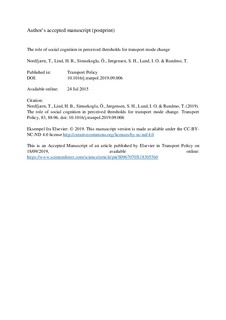The role of social cognition in perceived thresholds for transport mode change
Nordfjærn, Trond; Lind, Hans Brende; Simsekoglu, Ozlem; Jørgensen, Stig Halvard; Lund, Ingunn Olea; Rundmo, Torbjørn
Journal article, Peer reviewed
Accepted version
Permanent lenke
http://hdl.handle.net/11250/2644669Utgivelsesdato
2019Metadata
Vis full innførselSamlinger
Originalversjon
Nordfjærn, T., Lind, H. B., Simsekoglu, Ö., Jørgensen, S. H., Lund, I. O. & Rundmo, T. (2019). The role of social cognition in perceived thresholds for transport mode change. Transport Policy, 83, 88-96. doi: 10.1016/j.tranpol.2019.09.006Sammendrag
This article is based on a study that investigated social cognitive psychological factors associated with economic thresholds related to using public or other sustainable transport modes. A survey was conducted using a random sample of the Norwegian population living in the six largest urban regions (n = 1039). The respondents were asked to indicate the monthly increase in car taxes and fees that they would perceive necessary to make them use sustainable transport modes instead of their private car. The findings revealed that those who perceived themselves as definitive car users (strongly reluctant to change transport mode) reported low tolerance of push measures, low awareness of and ascription of responsibility for the consequences of car use, and weak environmental norms. Environmental norms, attitudes towards transport and push measure tolerance were the strongest predictors of the respondents belonging to either the lowest or the highest threshold groups. The authors conclude that measures aimed at increasing the costs of car use and improving the accessibility of public transport in urban areas could be supplemented by social cognitive factors.

